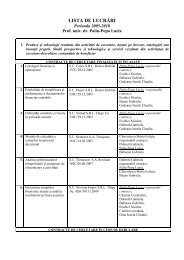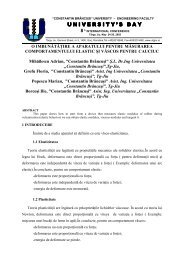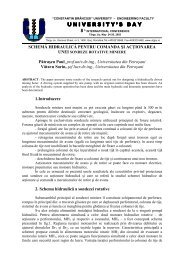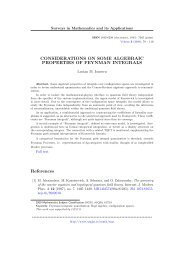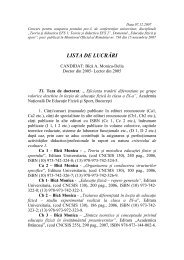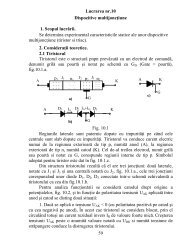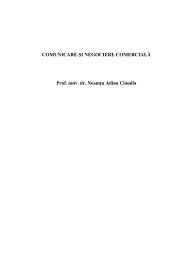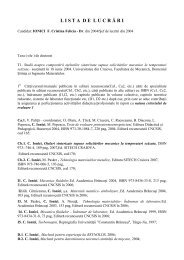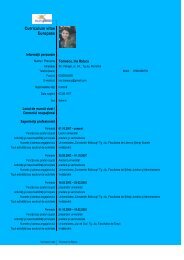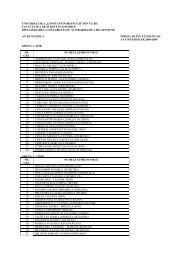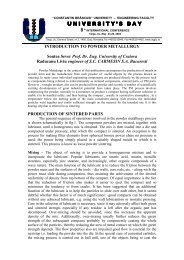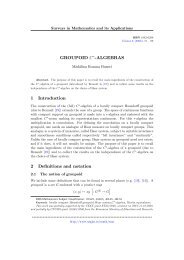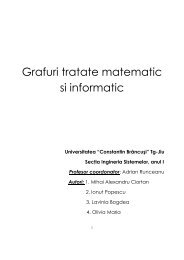NO. 2 / 2008 - Universitatea "Constantin BrâncuÅi"
NO. 2 / 2008 - Universitatea "Constantin BrâncuÅi"
NO. 2 / 2008 - Universitatea "Constantin BrâncuÅi"
Create successful ePaper yourself
Turn your PDF publications into a flip-book with our unique Google optimized e-Paper software.
Analele Universităţii “<strong>Constantin</strong> Brâncuşi” din Târgu Jiu, Seria Litere şi Ştiinţe Sociale, Nr. 2/<strong>2008</strong>lor) sunt creative în ceea ce priveşte noilecontraste şi intensităţi într-o nouă regiuneextensivă (în sensul tehnic al Procesului şiRealităţii, Partea a IV-a). Prin definiţie,regiunea extensivă ocupată de actualitateanouă nu a fost niciodată ocupată din nou dealtă actualitate; mai mult, exact aceleaşicontraste nu au fost posibile înainte şi nuvor fi posibile după coeziunea dată;intensitatea experienţei sale, fiind privatădin punct de vedere eminent, este spulcrală,incomparabilă.Actualităţile sunt eficiente prinloialitatea lor structurală faţă de lume(obiectivă şi superjectivă). Fiecareactualitate îşi are izvorul în eficienţatrecutului (sau „lumea reală”) şi, la rândulsău, ocazionează un anumit tip de viitor.Comparaţia intensităţilor interioare esteposibilă numai în acest context structural,ex post.Actualităţile sunt vizionare prininstalarea unei tendinţe către intensităţi maimari ale experienţei. Interacţiuneacreativităţii şi eficienţei nu garantează unavans creator deloc, numai cruzimeaexistenţei. Creativitatea este într-adevărtotal sălbatică în timp ce eficienţa impune onecesitate oarbă asupra izbucnirilorcreatoare. S-a remarcat adesea căWhitehead a fost un domn Victorian alcărui optimism suprem a fost direct inspiratde utopia tehnico-ştiinţifică a semenilor săi(cf. Thomas Henry Huxley), care este însuşiinseparabilă Zeitgeist, al RomantismuluiSecolului al XIX-lea, al evoluţionismuluilui Darwin şi al unei credinţe oarbe înreoluţia industrială rapidă şi în importanţacivilizatoare a colonialismului britanic.În rezumat, din perspectiva fiinţelorumane, creativitatea este într-adevăr fondulavansului creator, dar aceasta nu esteîntreaga poveste: eficienţa implică datoriaşi viziunea implică veneraţia. Ignorareaveneraţiei şi datoriei ar fi echivalentă pentrua acţiona ca şi când am fi blocaţi la stadiulpreoperaţional al lui Piaget (vârstele de 2-7,când aptitudinile motorii sunt coordonatedar fără vreo acţiune mentală semnificativăfundamental characteristics of allprocesses—creativity, efficacy and vision.All actualities (according to theirgrade) are creative in so far as they embodynew contrasts and intensities in a newextensive region (in the technical sense ofProcess and Reality’s Part IV). Bydefinition, the extensive region occupied bythe new actuality was never occupied byany actuality and will never be occupiedagain by some other actuality; furthermore,the exact same contrasts were not possiblebefore and will not be possible after thegiven concrescence; the intensity of itsexperience, in so far as it is eminentlyprivate, is sepulchral, incomparable.Actualities are efficacious throughtheir structural (objective and superjective)world-loyalty. Every actuality springs fromthe efficacy of its past (or prehended“actual world”) and, in its turn, occasions acertain type of future. The comparison ofembodied intensities is only possible in thisstructural context, i.e., ex post.Actualities are visionary through theinstantiation of a trend towards higherintensities of experience. The sole interplayof creativity and efficacy does notguarantee any creative advance at all, onlythe ruthlessness of existence. Creativity isindeed totally wild while efficacy imposes ablind necessity upon the creative outbursts.It has been often remarked that Whiteheadwas a Victorian gentleman whose supremeoptimism had been directly inspired by thetechno-scientific utopia of his peers (cf.Thomas Henry Huxley), which is itselfinseparable from his Zeitgeist, made ofnineteenth Century Romanticism, ofDarwinian evolutionism, and of a blindfaith in the accelerating industrialrevolution and in the civilizing importanceof British colonialism.In sum, from the perspective ofhuman beings, creativity is indeed the cruxof the creative advance, but it is by nomeans the entire story: efficacy involvesduty and vision involves reverence.Ignoring duty and reverence would beAnnals of the „<strong>Constantin</strong> Brâncuşi” University of Târgu Jiu, Series Letters and Social Sciences, No. 2/<strong>2008</strong>48



